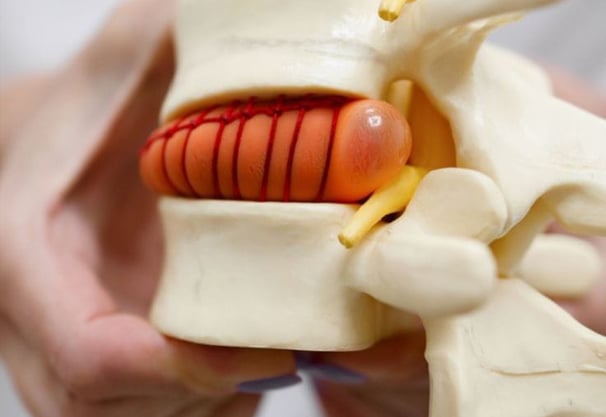Herniated Disc : Causes, Symptoms, and How to Treat It
Do you often experience back pain or tingling? A herniated disc could be the cause. Learn about the causes, symptoms, and non-surgical treatments for a herniated disc, as well as tips to prevent this condition. You’ll also find recommendations for health products to support your posture and spinal health.
BODY HEALTHHERNIATED DISCBACK PAIN HERNIATED DISCHEALTHY SITTING HABITS
11/13/20243 min read


A herniated disc is a condition that commonly affects people who engage in prolonged activities, such as sitting or standing incorrectly for extended periods. A herniated disc can be extremely painful if it presses on the nerves in the spine. This article explains the causes, symptoms, treatment, and prevention steps for a herniated disc. If you or someone close to you is experiencing back pain or other symptoms, learn how to effectively address this condition.
What is a Herniated Disc?
A herniated disc, also known as a slipped or ruptured disc, occurs when the inner part of the spinal disc, known as the nucleus pulposus, pushes through the tougher outer layer, the annulus fibrosus. These discs sit between the vertebrae to absorb pressure and allow flexibility. When the nucleus pulposus is pushed out, it can press on the nerves and cause pain or even interfere with bodily functions.
Causes of a Herniated Disc
Several main factors contribute to a herniated disc, including:
Aging: As we age, the discs lose elasticity and moisture, making them more prone to tearing or bulging.
Physical Trauma or Injury: A hard impact, such as from an accident or intense sports activity, can damage the discs.
Poor Posture: Sitting or standing in incorrect positions can excessively pressure the spine.
Lifting Heavy Loads: Lifting with improper technique can increase strain on the spine.
Symptoms of a Herniated Disc
The symptoms of a herniated disc can vary depending on the location of the affected disc. Common symptoms include:
Lower back pain
Pain radiating down the legs or arms
Muscle weakness
Numbness or tingling
📝 Read more : Herniated Disc: Symptoms You Need to Know
Diagnosing a Herniated Disc
Doctors can use several methods to diagnose a herniated disc, including:
Physical Examination: Testing reflexes, muscle strength, and body movements to detect areas of pain.
Imaging: MRI is the most common imaging technique to view the condition of the discs. CT scans and X-rays may also be used to assess damage to the spine.
Treatment for a Herniated Disc
Non-Surgical Treatments:
Physical Therapy
Pain Relief Medications
Corticosteroid Injections
Rest and Activity Modification
Surgical Treatments:
Discectomy
Laminectomy
Spinal Fusion
📝 Read more : Herniated Disc Treatment: Non-Surgical and Surgical Approaches
Prevention of a Herniated Disc
Preventing a herniated disc can be achieved with the following methods:
Maintain Good Posture: Always sit and stand with correct posture to reduce pressure on the spine.
Use Proper Lifting Techniques: Use correct techniques when lifting heavy objects, such as bending your knees instead of relying on your back.
Regular Exercise: Engaging in physical activities like walking, swimming, and core exercises can strengthen back muscles.
Avoid Smoking: Smokers with herniated discs should quit, as smoking can reduce blood flow to the spine and accelerate disc degeneration.
Products to Support Back Health
To help maintain back health and prevent pain caused by a herniated disc, you may consider products such as lumbar support pillows designed to support the spine while sitting or ergonomic chairs that help maintain proper posture while working.
Click here to see the best back health product recommendations!
FAQ about Herniated Discs
What’s the difference between a herniated disc and a pinched nerve?
A herniated disc is a condition where the spinal disc bulges out and may press on the nerves. A pinched nerve is the result of this pressure causing pain or numbness.
Can a herniated disc heal without surgery?
Yes, many cases of a herniated disc can heal with non-surgical treatments such as physical therapy, medication, and rest.
How long is the recovery time for a herniated disc?
Recovery time varies, from a few weeks to several months, depending on the severity of the hernia and the type of treatment used.
Can a herniated disc recur?
Yes, a herniated disc can recur, especially if a lifestyle that supports spinal health is not maintained.
When should I consult a doctor?
If your back pain persists for more than a few weeks or is accompanied by weakness, numbness, or radiating pain, consult a doctor immediately.
A herniated disc is a condition that can cause pain and limit movement, but with the right treatment, many sufferers can recover and resume their daily activities. Understanding the symptoms, causes, and preventive measures for a herniated disc is important for maintaining spinal health. Don’t hesitate to consult a healthcare provider if you experience symptoms of a herniated disc, and always remember to maintain good posture and engage in physical activities that support your back health.
illustration of the nucleus pulposus is pushed out
